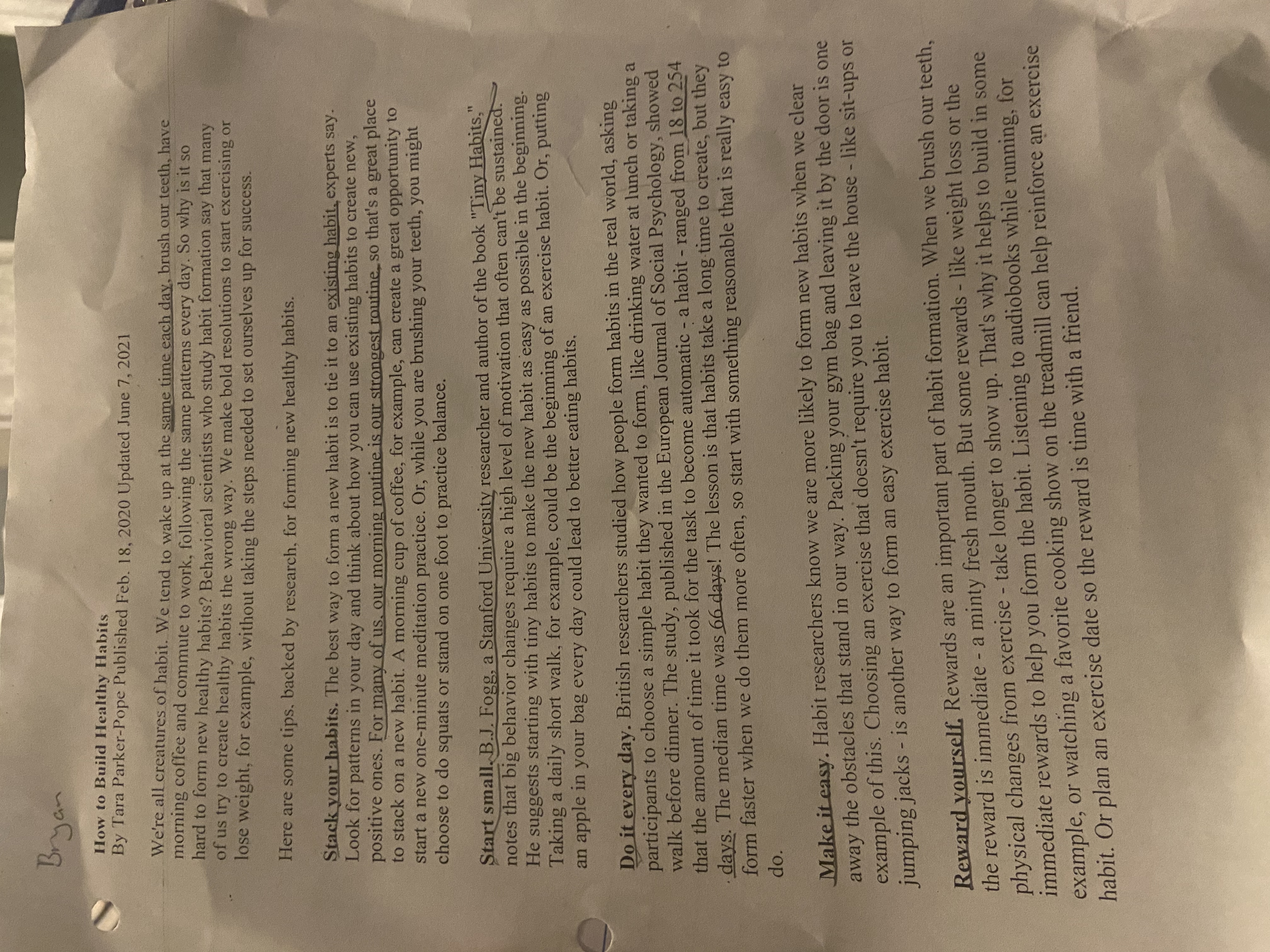Answered step by step
Verified Expert Solution
Question
1 Approved Answer
E Summarize article hich the article what is the about idea was the most important? Scientists claim create healthy habits the most people try


E Summarize article hich the article what is the about idea was the most important? Scientists claim create healthy habits the most people try to wrong way what does author mean by that? what mistakes do people make When trying make new habits. (3 which strategies do you find most helpful? why? F # which strategies do you find least helpful? 6/ what Bryan How to Build Healthy Habits By Tara Parker-Pope Published Feb. 18, 2020 Updated June 7, 2021 We're all creatures of habit. We tend to wake up at the same time each day, brush our teeth, have morning coffee and commute to work, following the same patterns every day. So why is it so hard to form new healthy habits? Behavioral scientists who study habit formation say that many of us try to create healthy habits the wrong way. We make bold resolutions to start exercising or lose weight, for example, without taking the steps needed to set ourselves up for success. Here are some tips, backed by research, for forming new healthy habits. Stack your habits. The best way to form a new habit is to tie it to an existing habit, experts say. Look for patterns in your day and think about how you can use existing habits to create new, positive ones. For many of us, our morning routine is our strongest routine, so that's a great place to stack on a new habit. A morning cup of coffee, for example, can create a great opportunity to start a new one-minute meditation practice. Or, while you are brushing your teeth, you might choose to do squats or stand on one foot to practice balance. 11 Start small, B.J. Fogg, a Stanford University researcher and author of the book "Tiny Habits," notes that big behavior changes require a high level of motivation that often can't be sustained. suggests starting with tiny habits to make the new habit as easy as possible in the beginning. He Taking a daily short walk, for example, could be the beginning of an exercise habit. Or, putting an apple in your bag every day could lead to better eating habits. Do it every day. British researchers studied how people form habits in the real world, asking participants to choose a simple habit they wanted to form, like drinking water at lunch or taking a walk before dinner. The study, published in the European Journal of Social Psychology, showed that the amount of time it took for the task to become automatic - a habit - ranged from 18 to 254 days. The median time was 66 days! The lesson is that habits take a long time to create, but they form faster when we do them more often, so start with something reasonable that is really easy to do. Make it easy. Habit researchers know we are more likely to form new habits when we clear away the obstacles that stand in our way. Packing your gym bag and leaving it by the door is one example of this. Choosing an exercise that doesn't require you to leave the house - like sit-ups or jumping jacks - is another way to form an easy exercise habit. Reward yourself. Rewards are an important part of habit formation. When we brush our teeth, the reward is immediate - a minty fresh mouth. But some rewards - like weight loss or the physical changes from exercise - take longer to show up. That's why it helps to build in some immediate rewards to help you form the habit. Listening to audiobooks while running, for example, or watching a favorite cooking show on the treadmill can help reinforce an exercise habit. Or plan an exercise date so the reward is time with a friend.
Step by Step Solution
There are 3 Steps involved in it
Step: 1

Get Instant Access to Expert-Tailored Solutions
See step-by-step solutions with expert insights and AI powered tools for academic success
Step: 2

Step: 3

Ace Your Homework with AI
Get the answers you need in no time with our AI-driven, step-by-step assistance
Get Started


